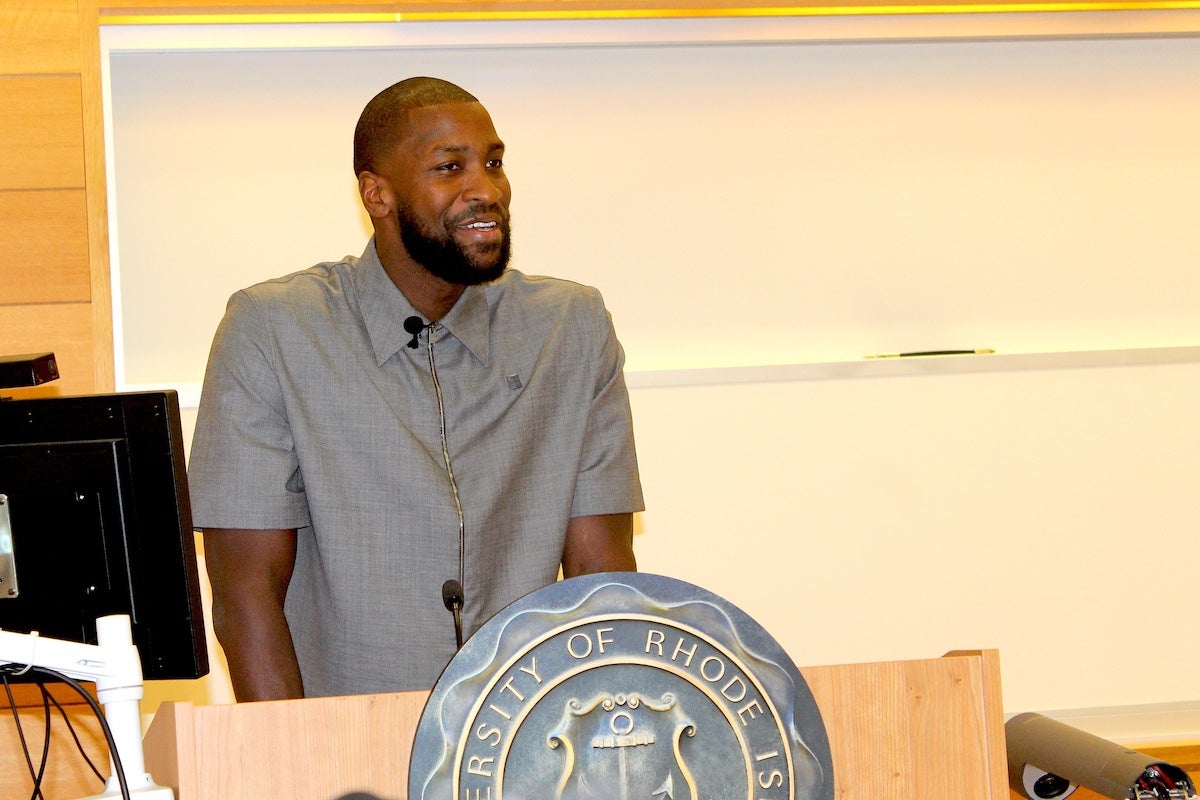Michael Kidd-Gilchrist encourages speech language pathology students to continue helping people who ‘suffer in silence’
Former NBA star and advocate for people who stutter Michael Kidd-Gilchrist offered advice and inspiration for those who share the often lifelong condition, encouraging them to be who they are despite their communication challenges, during a presentation on the University of Rhode Island Kingston Campus Nov. 7.
“This is who I am. I’m not perfect; I’m not a motivational speaker or anything like that. I am Michael Kidd-Gilchrist, family man, father, ex-athlete—and also a person who stutters,” Kidd-Gilchrist told a mostly full auditorium in the Beaupre Center for Chemical and Forensic Sciences. “I would love for those young people and adults to have that same vision of themselves. This is who they are, and it’s perfectly OK to stutter. You all can be whatever you want to be—doctor, teacher, SLP, athlete, actor, or president of the United States.”
Kidd-Gilchrist—who won a national championship at the University of Kentucky and was drafted second overall into the NBA in 2012, playing eight seasons, mostly with the Charlotte Hornets—is CEO of Change & Impact, a nonprofit organization he founded in 2021 to improve health care access for individuals who stutter and expand the resources available to them. The issue is personal to him, and part of his mission is to meet with other people who stutter, share his experiences, and inspire them to move beyond the condition to find success and happiness, according to Alisa Baron, assistant professor of communicative disorders, who organized Kidd-Gilchrist’s visit.
“Having someone who has been successful in their career say ‘Hey, I stutter, and I’ve been able to navigate life while stuttering and do well for myself,’ is a lived experience that people who stutter can feel encouraged and maybe motivated by,” Baron said. “He didn’t let his stutter hold him back from pursuing his dream in sports, and doing well at the national level. Being in the NBA is a huge accomplishment, and everyone has a different journey—but there are a lot of commonalities, and I think kids and adults who stutter will be able to identify with his story.”
Earlier in the day, Kidd-Gilchrist met with students who stutter at three area schools, beginning with Warwick Veterans Memorial Middle School, followed by North Kingstown High School and Westerly Middle School. There and on the URI campus, he talked about his experiences growing up with a stutter and the loneliness that can result from a difficulty to communicate. He praised the speech language pathologists who helped him find the confidence to be himself and succeed in life despite the challenge.
“For people who stutter, we suffer in silence a lot of times. I remember being very, very insecure in myself as a person, even down to whether I wanted to play this game anymore,” Kidd-Gilchrist told the audience, which included several URI students in speech language pathology. “I appreciate all of you SLPs here; I don’t think you all get a lot of credit. Without you guys, I wouldn’t be up here speaking today.”
In addition to traveling the country to inspire others who stutter, Kidd-Gilchrist is a voice for the stuttering community before federal and state legislators. Last year on Capitol Hill, he facilitated the establishment of the Bipartisan Unified Voices Caucus, which advocates for individuals with communication challenges, primarily focusing on stuttering. This year, Kentucky and Pennsylvania passed state mandates to require insurance plans to include coverage for habilitative and rehabilitative speech therapy for childhood stuttering. As the leader of Change & Impact, Kidd-Gilchrist continues to travel around the country to lobby state legislatures for such change.
“I have a platform to advocate, and I’m not going to stop. I want to get all the states. Two down; I have a lot more to go,” he said. “I accept who I am as a whole, and I want to inspire others, and educate those who don’t know about stuttering.”

